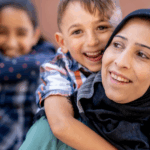 “There can be no keener revelation of a society’s soul than the way in which it treats its children.” Nelson Mandela
“There can be no keener revelation of a society’s soul than the way in which it treats its children.” Nelson Mandela
As I reflect on the happenings in the world these last few weeks, Nelson Mandela’s quote is more poignant than ever. So many challenges plague the world today that require a collective, collaborative response from society—citizens and leaders working together. Whether it’s countries ravished by war, terrorism and extremism; children and communities devastated by hunger and disease; or communities fighting against seeming injustice—no matter how big or small—we must not relent on ridding society of these ills that threaten humanity and the well-being of our children.
So I come to Georgia, where some might say we have it pretty good, but others say not so much. Some tout measures that indicate we’re the #1 state to do business, while other measures show we lag when it comes to quality of life and education—two critical elements of success for our children.
The Annie E. Casey Foundation recently released its 25th annual KIDS COUNT Data Book which ranks Georgia 42nd among states in overall child well-being. The overall ranking is derived from four domains that are also ranked separately: economic well-being (44), education (40), health (38), and family and community (39). Georgia is a far cry from its near-bottom ranking (48) when the first Data Book was released 25 years ago, but it has remained in the bottom 10 states for the majority of that quarter century. We celebrate the incremental progress. However, a more deliberate, focused response is required to overcome the persistent challenges that plague Georgia children.
Georgia’s overall well-being and future success depends on its ability to improve conditions for children. If Georgia’s children fare better, so will Georgia.
Increased child poverty is a result of too few jobs, low wages and the resulting economic hardship that inflicts on the families in which they live. Our current education, economic development, and social welfare public policies, along with public-private partnerships like Georgia Family Connection and ARC’s Competitiveness Initiative, must address these broader economic barriers that keep many families from being self-sufficient.
Specifically, improving the quality of our children’s education, boosting high school graduation rates, and making colleges and technical schools more accessible and affordable will strengthen Georgia’s workforce. This will attract businesses to our state, create jobs and grow the economy. But there is much more we must do to accomplish this, starting with adequately funding our K-12 system to meet the needs of students.
Our leaders must make these goals a priority—not just a subject of election-year rhetoric and promises. We must have a concerted, targeted focus, making the strategic investments necessary over the long-haul and creating the partnerships necessary with business, community, and philanthropic leaders to solve these challenges. With today’s headlines in the world and national news, Georgia’s challenges are not unsurmountable. We can make things better and we must.
To quote another person who dedicated her life to making the world a better place, Margaret Mead: Never doubt that a small group of thoughtful, committed citizens can change the world. Indeed, it is the only thing that ever has.








